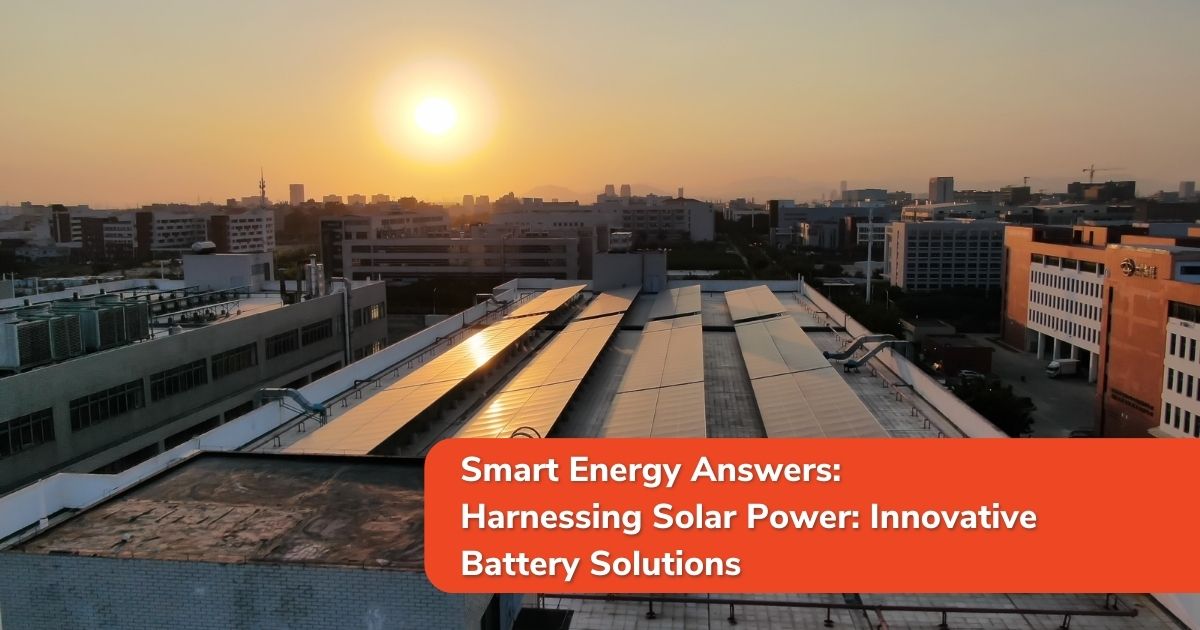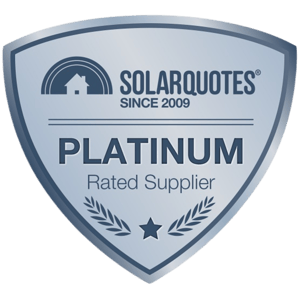Harnessing Solar Power: Innovative Battery Solutions

Discover the latest advancements in solar battery solutions for sustainable energy usage.
Significance of battery storage in maximising the efficiency of solar power systems
Battery storage plays a significant role in maximising the efficiency of solar power systems. By storing excess energy generated during the day, batteries provide a reliable source of power during periods of low sunlight or high energy demand. This helps to ensure a consistent and uninterrupted supply of electricity, reducing reliance on the grid and promoting energy independence.
Additionally, batteries allow for the optimisation of solar power systems by enabling the capture and utilisation of excess energy that would otherwise go to waste. This improves the overall efficiency of the system and maximises the return on investment for solar panel installations.
Explanation of how solar power batteries store and distribute energy
Solar power batteries store and distribute energy through a process known as charge and discharge. During periods of excess solar energy production, the batteries absorb and store the energy for later use. This stored energy can then be discharged when the demand for electricity exceeds the supply from the solar panels.
The charging process involves converting the solar energy into chemical energy, which is stored in the battery cells. This chemical energy is then converted back into electrical energy when needed. The distribution of energy from the battery to the electrical system is facilitated through an inverter, which converts the direct current (DC) stored in the battery into alternating current (AC) that can be used to power household appliances and devices.
Analysis of high-capacity and high-efficiency lithium-ion batteries suitable for solar applications
Lithium-ion batteries have emerged as a popular choice for solar applications due to their high capacity and efficiency. These batteries offer a greater energy density, allowing for more energy storage in a smaller physical footprint. This is particularly beneficial for residential solar installations where space is limited.
Furthermore, lithium-ion batteries have a longer lifespan compared to other battery technologies, making them a reliable and cost-effective solution for long-term energy storage. Their ability to handle high charge and discharge rates also contributes to their suitability for solar applications, as they can efficiently handle the fluctuating energy demands of a solar power system.
Examination of advancements in flow battery technology, such as improved efficiency and lifespan
Flow battery technology has seen significant advancements in recent years, offering improved efficiency and lifespan for solar applications. Flow batteries utilise two electrolyte solutions that flow through separate chambers and are separated by a membrane. This design allows for the independent scaling of energy storage capacity and power output.
The advancements in flow battery technology have led to increased energy efficiency, with higher round-trip efficiency rates and reduced energy losses during the charging and discharging process. Additionally, the lifespan of flow batteries has improved, enabling longer-term and more reliable energy storage solutions for solar power systems.
Introduction to solid-state battery technology and its potential benefits for solar storage
Solid-state battery technology is an emerging innovation in the field of energy storage and holds great potential for solar applications. Unlike traditional lithium-ion batteries, solid-state batteries replace the liquid or gel electrolyte with a solid material, which enhances their performance and safety.
The use of solid-state electrolytes in batteries offers several benefits for solar storage. Firstly, solid-state batteries have a higher energy density, allowing for increased energy storage capacity in a smaller size. Secondly, they exhibit improved safety characteristics, as the solid electrolyte is less prone to leakage or thermal runaway. Lastly, solid-state batteries have a longer cycle life, enabling greater longevity and durability for solar power systems.
Importance of solid-state batteries in offering enhanced safety, energy density, and longevity for solar applications
Solid-state batteries are of significant importance in the realm of solar applications due to their enhanced safety, energy density, and longevity. The use of solid-state electrolytes eliminates the risk of leakage or combustion associated with traditional liquid electrolytes, ensuring a safer energy storage solution for both residential and commercial solar installations.
Furthermore, solid-state batteries offer a higher energy density, allowing for greater energy storage capacity in a smaller physical footprint. This is particularly advantageous for applications where space is limited, such as rooftop solar systems. Additionally, the longer cycle life of solid-state batteries ensures a more durable and sustainable energy storage solution for solar power systems.
Integration of multiple battery technologies into hybrid energy storage systems for solar applications
The integration of multiple battery technologies into hybrid energy storage systems offers a comprehensive solution for solar applications. By combining different types of batteries, such as lithium-ion and flow batteries, hybrid energy storage systems can leverage the unique advantages of each technology and optimize their performance.
For example, lithium-ion batteries can provide high-power output and handle rapid charge and discharge rates, while flow batteries can offer long-duration energy storage and high energy capacity. This combination allows for a more flexible and efficient energy storage solution that can adapt to varying energy demands and maximize the utilization of solar power.
Hybrid energy storage systems in optimising performance, reliability, and cost-effectiveness
Hybrid energy storage systems play a crucial role in optimizing the performance, reliability, and cost-effectiveness of solar power systems. By integrating multiple battery technologies, these systems can achieve a balance between power output, energy capacity, and longevity.
The combination of different battery technologies allows for better load management, ensuring a stable and reliable power supply even during periods of high energy demand. This enhances the overall performance of the solar power system and reduces the reliance on the grid.
Moreover, hybrid energy storage systems can contribute to cost-effectiveness by maximizing the utilization of renewable energy sources. By storing excess solar energy and utilizing it during peak demand periods, homeowners can reduce their reliance on grid electricity and potentially lower their energy bills.
Assessment of the current market landscape for innovative solar power battery solutions
The current market landscape for innovative solar power battery solutions is rapidly evolving, driven by the increasing demand for sustainable energy storage options. Various companies and manufacturers are developing and introducing new battery technologies that offer improved performance, efficiency, and safety.
The market is witnessing advancements in lithium-ion batteries, flow batteries, and solid-state batteries, each offering unique benefits for solar applications. Additionally, there is a growing focus on the integration of multiple battery technologies into hybrid energy storage systems, further expanding the range of options available to consumers.
As the market continues to evolve, it is essential for consumers to stay informed about the latest advancements and choose the battery solutions that best suit their specific needs and requirements.
Recap of the importance of innovative battery solutions for harnessing solar power and call to action
Innovative battery solutions play a crucial role in harnessing the power of solar energy and promoting sustainable energy usage. By maximizing the efficiency of solar power systems and providing reliable energy storage options, batteries enable homeowners and businesses to reduce their carbon footprint and achieve energy independence.
To fully leverage the benefits of solar power and contribute to a greener future, it is important to stay updated on the latest advancements in battery technology and choose innovative solutions that align with sustainability goals. By investing in solar battery solutions, individuals can make a significant impact in the transition towards a clean and renewable energy future.
%20(1).png?width=265&height=96&name=www.smartenergyanswers.com.auhs-fshubfsSmart%20Energy%20Answers%20Logo%20(HIRES)%20(1).png)

.png?width=514&height=121&name=Tesla%20Powerwall%203%20(new).png)







